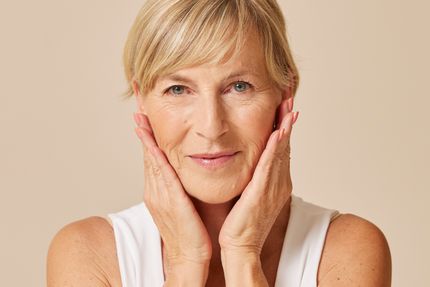Night sweats and menopause
Waking up at night drenched in sweat? Night sweats are a common symptom of menopause. Fluctuations in hormone levels disrupt your body temperature, causing you to feel hot. This can happen at any time of the day (hot flashes) or night (night sweats). Night sweats and hot flashes are two of the most common symptoms that menopausal women experience.

I never thought menopause would cause me to wake up night after night drenched in sweat. - Irene (age 51)

Around 80 percent of women going through menopause experience night sweats to some degree, particularly in perimenopause, when hormone fluctuations are most extreme. Around menopause, only 50 percent of women suffer from them, although they can be more severe. For most women, night sweats go away after the menopause and don’t linger into postmenopause.
Night sweats can happen at any time and go away by themselves. Duration, frequency, and intensity of night sweats differ, but episodes tend to last for two to three minutes. Now a few minutes may not seem long, but it’s enough to leave you tossing and turning the rest of the night.
What is happening in your body?
Oestrogen plays an important role in regulating body temperature. When you approach menopause and your oestrogen levels start to decline, your brain can get a signal that you're too hot (even though you're not). This initiates an intense cooling response, causing your blood vessels to widen and you to start sweating profusely.
It's basically the same process as with hot flashes. If hot flashes accompany menopause and occur at night and cause sweating, they are called night sweats. These nocturnal hot flashes can be particularly disruptive to sleep and affect how you feel during the day, like irritated or sad, creating a vicious cycle that can be challenging to break. But it can be done.
Most women have multiple menopausal symptoms. In addition to night sweats, women may experience weight gain, mood swings or heavy menstrual bleeding.
Other causes
Night sweats, like hot flashes, are related to hormone changes. But there are also other factors that trigger them. We know that stress and anxiety can trigger or exacerbate hot flashes and other menopausal symptoms. When you have prolonged or chronic stress, your cortisol levels rise. Increased cortisol levels impact the production of oestrogen. Women with stressful lives tend to have more hot flashes during menopause than women whose lives are less busy. Certain medications and underlying medical conditions can also be a contributing factor in hot flashes and night sweats.
What can you do?
Various lifestyle adjustments are known to reduce hot flashes (as well as other menopausal symptoms). Here are some helpful tips.
- When you wake up at night drenched in sweat, stay calm and focus on your breathing. Breathe in slowly through your nose and out through your mouth. This reduces the stress response in your body and calms hot flashes.
- Try to avoid triggers as much as possible. Alcohol, spicy foods, sugar, coffee and other products containing caffeine disrupt your body temperature and can trigger night sweats. The same goes for smoking and stress.
- Regular exercise helps reduce symptoms. Go for medium-impact sports (i.e., no high-intensity training), such as jogging, CrossFit workouts or Pilates. An added bonus is that exercise has also been proven to improve sleep.
- Drink plenty of water to stay hydrated. If you sweat excessively at night, you are likely dehydrated when you wake up.

Medication for nights sweats
Are night sweats disturbing your sleep? There are hormonal as well as non-hormonal medications available for night sweats.

What treatment is right for you?
Physical activity and trigger avoidance are good ways to reduce hot flashes and night sweats. But sometimes this isn’t enough. If this is the case, you could consider hormone therapy.
Hormone therapy for night sweats
Specialists consider hormone replacement therapy (HRT) to be the most effective treatment for vasomotor symptoms of menopause, commonly called hot flashes and night sweats. HRT works by supplementing the body with hormones that are lost during menopause. By restoring hormone levels, HRT can alleviate these symptoms and improve overall well-being.
The two main types of hormones used in hormone replacement therapy are bioidentical hormones and synthetic hormones. Which type you choose depends on your personal needs. Options include Lenzetto (bioidentical oestradiol), Zumenon (bioidentical oestradiol) and Trisequens (bioidentical oestradiol and progestogen).

I was fed up and frustrated. After reading up on HRT and talking to my GP, I decided to give it a go. I can finally sleep through the night. - Katja (age 47)

Sources
- NIH National Insitute of Aging. (2021). Hot Flashes: What Can I Do? https://www.nia.nih.gov
- Suszynski M, Chang L, MD. (2011). Menopause and Sweating. https://www.webmd.com/menopause/features/menopause-sweating-11.
- Hoga L, Rodolpho J, Gonçalves B, Quirino B. (2015). Women's experience of menopause: a systematic review of qualitative evidence. PMID: 26455946.
- Bansal R, Aggarwal N. (2019). Menopausal Hot Flashes: A Concise Review. PMID: 31001050.
- Elavsky S, Gonzales JU, Proctor DN, Williams N, Henderson VW. (2012). Effects of physical activity on vasomotor symptoms: examination using objective and subjective measures. PMID: 22735162.
Your path to a smooth menopause starts here
Get the tools you need to navigate menopause with more ease and to educate yourself about your body. With tips and insights from experts, and relatable stories of women just like you. Press play, not pause.
Tips and advice


FAQ
When will I stop getting hot flashes?
More than 80 percent of women experience night sweats to some degree, especially during perimenopause. Around menopause, only 50 percent of women suffer from them (although they can be more severe). For most women, night sweats go away after the menopause and don’t linger into postmenopause.












